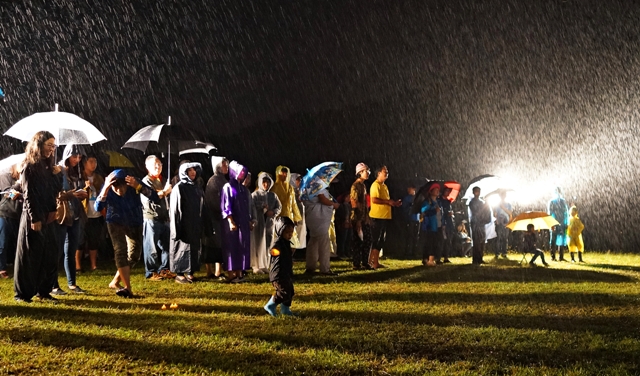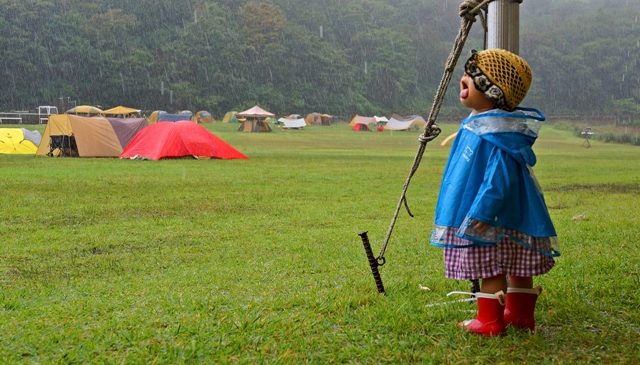| |
 |
|
| Holding hands in an unbroken circle of dance near scuptures of branches Photo by Lee San-chaek |
“Many people don’t understand the spirit of the Peace Festival,” organizer Bang Seung-cheol explained over a cup of chai, “it’s not “good” business.”
For anyone who grew up watching the Woodstock generation cash in and burn out, the word peace might feel like just another marketing tool. And with good reason. Much of the 60’s counterculture in America has become mere commodity. Ideals and images that executives sell with great success. From the music of Hendrix in car commercials, to hippie Halloween costumes at Daiso: peace has become “good business”.
However, for organizer Seung-cheol, peace is far from being an advertising cliché. You won’t find busloads of tourists at this festival, even though agencies have approached him to do so. For Seung-cheol, it’s not about being profitable, nor is it simply about having a party. It’s about sustainability and spirit.
His story is a perfect key for understanding the principles that guide this festival: One man’s contributions as a representation of the community that makes it possible.
It began in 2014. An international group, including members of a peace festival from Japan, got together and decided to try something similar here in Jeju. Soon they were inviting participants and performers, laying the groundwork for a large scale event. However disagreements began to dominate their planning. Conflicts erupted, and with only forty-nine days before the scheduled start of the festival, creative differences tore the group apart.
One of the musical guests who had been invited to perform at the event, however, remained. Faced with the overwhelming irony of a peace festival cancelled due to fighting, Seung-cheol decided that he wanted to try and make it work.
Without even really understanding his own motivations yet, Seung-cheol became the de facto organizer. He was alone, the festival had no money, no venue, and his friends all told him to abandon this doomed exposition. However, Seung-cheol couldn’t let it go.
Instead, he donated eight million Won of his own savings to get the ball rolling again. With raw enthusiasm he rallied a growing network of friends, acquaintances, and perfect strangers. This new group raised further donations, organized performances, planned workshops, and eventually found a place to set up camp.
| |
 |
|
| ▲ Bright lights illuminating fog, rain, and music at the 2016 Peace Festival Photo by Lee San-chaek |
Despite the odds, they were able to make the first festival a rousing success. How?
Seung-cheol suggests that it was due to the spirit of friendship. That authenticity that comes from working together, not for money, but for a common good. A feeling that’s all too absent in the casual violence of the normal fifty hour work week.
Repeatedly, Seung-cheol discussed the state of modern life. Why are we always in such a rush? When did work that we hate become more important than people we love? And if we’re not with the people we want to be with - pursuing activities that nourish us - what’s the point?
Searching for answers to these kinds of questions inspired Seung-cheol to devote himself to the Peace Festival in 2014. It was a difficult crossroads in his life that resulted in an event based on principles that are gaining ground here in Korea and abroad. From the way we act interpersonally, to the global economy; from the foods we eat, to the garbage we throw out. Far too many of us feel like we’re living lonely, unhealthy, and ultimately unsatisfying lives.
At the Peace Festival, people are included in the list of natural resources not to be depleted. Human ecology. Community sustainability. Cultivation and conservation of yourself as an important member of a larger system.
If this sounds some far-fetched, New Age sales pitch, your skepticism is understandable. It shouldn’t surprise you, however, that there’s a lot of idealism at a festival called Peace.
| |
 |
|
| ▲ Enjoying the taste of rain at the 2016 festival Photo by Lee San-chaek |
Perhaps it’s time we gave our cynicism a break, even if only for a little while. We seem so bombarded by relentless pessimism these days. So many stories focus on death, destruction, imminent collapse, and catastrophic failure. So much of our energy is spent worrying about the future. Maybe we need a little more idealism in our lives, if only to keep this important muscle from atrophying.
The folks at the Peace Festival are trying provide that exercise. Trying to create a space where it’s okay to admit that we want to change the world but we don’t know how. Just like we want to change ourselves, but don’t know how. A place where we might gain a little perspective and feel a little less alone. A time specifically set aside to cultivate our humanity.
When you go to this festival, turn to the people around you. Ask for help if you need it. Help others when you can. Eat, sleep, and dance. Enjoy workshops on recycling, seminars on home farming, traditional shaman rituals, live music, local food, and camping during this two night, three day yearly event. Take some time off from who you think you are in order to explore who you can become.
Casual English language support is available at the front entrance and from the people attending the event. There is a staff of sixty people who work in the core family group, and up to two thousand participants from all over the world who come to partake in this rare experience.
“It’s a success not because of numbers,” Seung-cheol concludes, “but because we’re learning how to find friendship again. Honesty and truth. Outside, and under the stars. Together.”
|






















